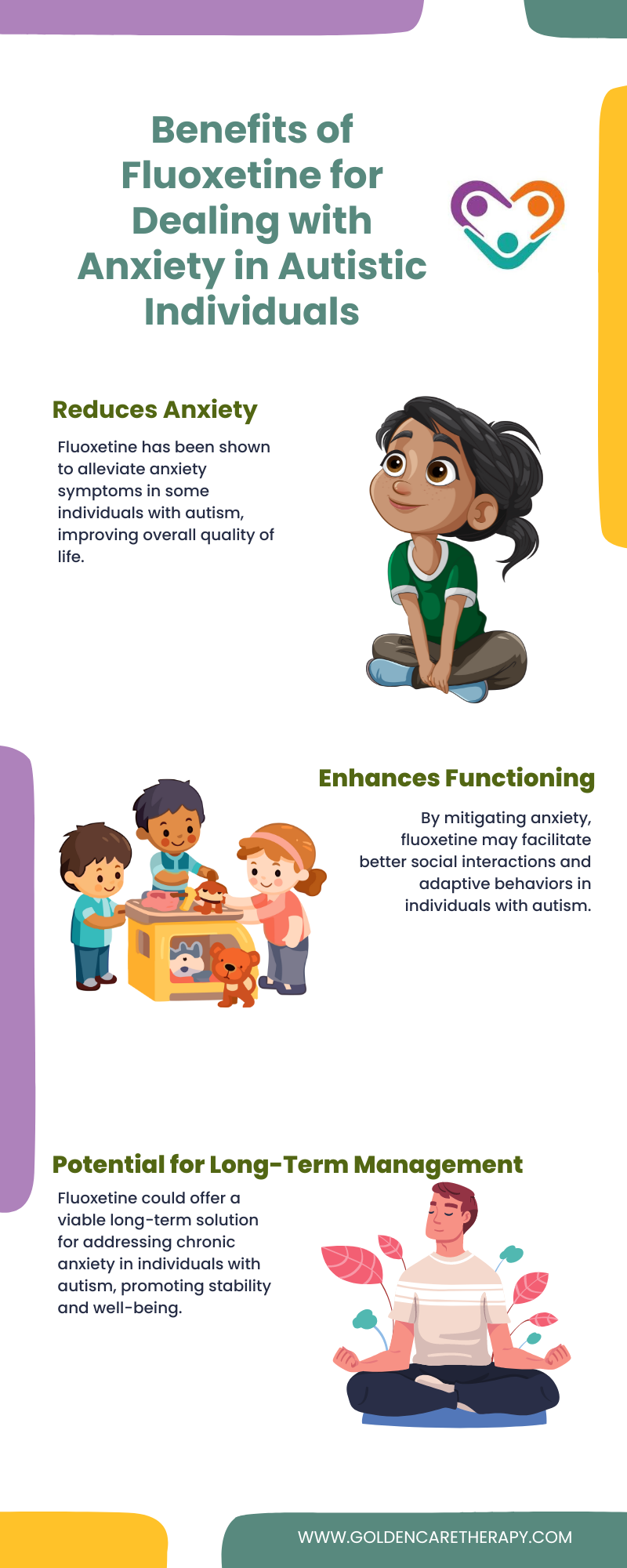
Table of Contents
Fluoxetine, commonly known as Prozac, is a medication that has been widely used to treat anxiety and depression. For individuals with autism, anxiety can be a significant challenge, often affecting daily life in profound ways.
Managing this anxiety is crucial to improving overall well-being, and fluoxetine has shown promise in helping with this aspect of autism. Understanding how this medication works and the effects it can have on anxiety levels in autistic individuals is important for those seeking effective treatments.
Impact of Anxiety on Autistic Individuals
Anxiety can have profound effects on individuals with autism, exacerbating the challenges they already face due to their neurodevelopmental condition.
The unique sensory sensitivities and social difficulties experienced by individuals on the autism spectrum can be intensified by anxiety, leading to increased stress, irritability, and communication difficulties.
It’s essential to recognize that anxiety can manifest differently in individuals with autism, sometimes presenting as repetitive behaviors, increased rigidity, or avoidance of certain situations. These manifestations can impact daily functioning, relationships, and overall quality of life for individuals with autism.
How Fluoxetine Can Help Manage Anxiety
Fluoxetine is a medication that has garnered attention for its potential effectiveness in addressing anxiety in individuals with autism. Understanding the role of Fluoxetine in managing autism-related anxiety is crucial for individuals and caregivers looking for viable interventions.
In case you’re wondering, Fluoxetine is a selective serotonin reuptake inhibitor (SSRI) that is often prescribed to treat various mental health conditions, including anxiety disorders. It works by increasing the levels of serotonin in the brain, which is a neurotransmitter that plays a key role in regulating mood and emotions.
Fluoxetine is prescribed by healthcare providers to help individuals with autism spectrum disorder manage symptoms of anxiety, obsessive-compulsive behaviors, and depression.
Its effectiveness in alleviating anxiety symptoms in individuals with autism has been a subject of research and study in recent years.
Research studies have explored the use of Fluoxetine as a potential intervention for managing anxiety in individuals with autism. These studies have provided insights into the efficacy and safety of Fluoxetine in this population, shedding light on its benefits and considerations.
Effectiveness of Fluoxetine
As we explore the use of fluoxetine for managing autism anxiety, we have to delve into the studies conducted and the findings that shed light on its efficacy. Additionally, understanding both the benefits and limitations of fluoxetine is crucial for informed decision-making in addressing autism-related anxiety.
Numerous studies have been conducted to assess the effectiveness of fluoxetine in treating anxiety symptoms in individuals with autism. These studies have revealed mixed results, with some indicating positive outcomes and others showing limited effects.
It is important to note that individual responses to fluoxetine can vary, highlighting the necessity for personalized treatment approaches.
One study found that Fluoxetine was associated with a reduction in anxiety symptoms in a significant number of individuals with autism. However, further research is needed to fully comprehend the mechanism of action and long-term effects of fluoxetine on autism-related anxiety.
That said, Fluoxetine has shown some exciting benefits which are as follows:

Examining the studies and findings related to fluoxetine and considering both its benefits and limitations helps caregivers and individuals with autism make informed decisions regarding the use of fluoxetine in managing anxiety.
Collaborating closely with healthcare providers and implementing a comprehensive treatment plan tailored to individual needs is key to optimizing the effectiveness of fluoxetine in addressing autism-related anxiety.
Individuals with autism who experience anxiety often benefit from a comprehensive and multidisciplinary approach to care. This holistic strategy involves addressing anxiety through various interventions and providing support that considers the individual’s unique needs and challenges.
A multidisciplinary approach is essential for effectively managing anxiety in individuals with autism. By involving a team of professionals from different disciplines, including psychologists, therapists, educators, and medical professionals, tailored support and interventions can be implemented to address the connection between autism and anxiety.
Collaboration among these professionals ensures a holistic and cohesive treatment plan that considers the individual’s cognitive, emotional, and behavioral needs.
This approach not only targets anxiety symptoms but also promotes overall well-being and quality of life for individuals with autism.
Families and caregivers also play a significant role in supporting individuals with autism anxiety. Providing resources and access to information can empower them to better understand and assist their loved ones in managing anxiety effectively.
Equipping them with resources not only helps them navigate the complexities of autism anxiety but also fosters a supportive environment that nurtures the well-being of individuals with autism.
Through knowledge, understanding, and peer support, families and caregivers can enhance their ability to provide effective care and advocacy for their loved ones. For those seeking professional support, our ABA therapy in New Jersey, Indiana, Georgia, and New York via Golden Care Therapy offers specialized services tailored to individual needs.
If you’re looking for expert guidance and personalized care, contact us today so you can learn more about how we can support your family’s journey.
Sources:
- What to Know Before Taking Medicine for Autism - October 4, 2024
- Is Risperidone Good for Autism? - October 4, 2024
- Exploring Glutathione Supplementation in Autism - October 4, 2024
